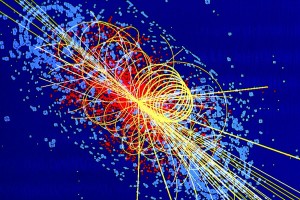 LONDON – Nearly two years after the highly-publicized discovery of the elusive ‘God Particle,’ scientists have determined that the current Big Bang model cannot account for the existence of the universe.
LONDON – Nearly two years after the highly-publicized discovery of the elusive ‘God Particle,’ scientists have determined that the current Big Bang model cannot account for the existence of the universe.
As previously reported, scientists in Europe announced in 2012 that they had detected the Higgs boson, then confirmed their findings last year. The Higgs boson, also known as “the God particle,” was widely heralded as a key to understanding the origins of the universe.
However, in a major setback to the secular Big Bang theory, scientists with King’s College in London announced this month that Higgs boson physics cannot account for the universe’s existence. The scientists came to this conclusion after modeling the hypothetical conditions of the universe immediately after the Big Bang.
“During the early universe, we expected cosmic inflation—this is a rapid expansion of the universe right after the Big Bang,” Robert Hogan, a physicist with King’s College, told LiveScience. “This expansion causes lots of stuff to shake around.”
However, Hogan added, the “shaking around” caused by the Big Bang would have brought catastrophic consequences to the early universe.
“If we shake it too much, we could go into this new energy space, which could cause the universe to collapse,” he said.
Incorporating “the God particle” into the Big Bang model only made matters worse.
“What [the scientists] found was bad news for, well, everything,” LiveScience reports. “The newborn universe should have experienced an intense jittering in the energy field, known as quantum fluctuation. Those jitters, in turn, could have disrupted the Higgs field, in essence rolling the entire system into a much lower energy state that would make the collapse of the universe inevitable.”
Hogan plans to share his findings today at the Royal Astronomical Society meeting in Portsmouth, England. Meanwhile, some suggest that these findings are evidence that the Big Bang theory is a flawed model which cannot account for the origin of the universe.
“Of course another possibility is a creative designer,” one online commenter succinctly noted.
Dr. Danny Faulkner, an astronomer with Answers in Genesis, says the Big Bang theory has repeatedly conflicted with observational evidence.
“When we hear the term big bang theory, many people assume it was conceived in its present form and has remained unassailed ever since,” Faulker wrote in a recent article.
“In reality,” he continued, “it is a very pliable model. Several assumed variables in the equations have been changed to make the numbers match new findings. Today’s big bang model little resembles the one your grandfather learned, and it is likely to continue morphing. Are these improvements, or just rescuing devices?”
Likewise, Drs. Jake Hebert and Jason Lisle with the Institute for Creation Research propose that a belief in God—not the Big Bang theory—is ultimately foundational for understanding the universe’s existence.
“If God chooses to use a Higgs field to set the masses of all particles, He can certainly do so,” they wrote in an online article. “The fact that such physics is possible or even meaningful would only make sense in a created universe that is controlled by the mind of God anyway. The study of how God upholds the universe today is the very essence of science.”
Become a Christian News Network Supporter...


